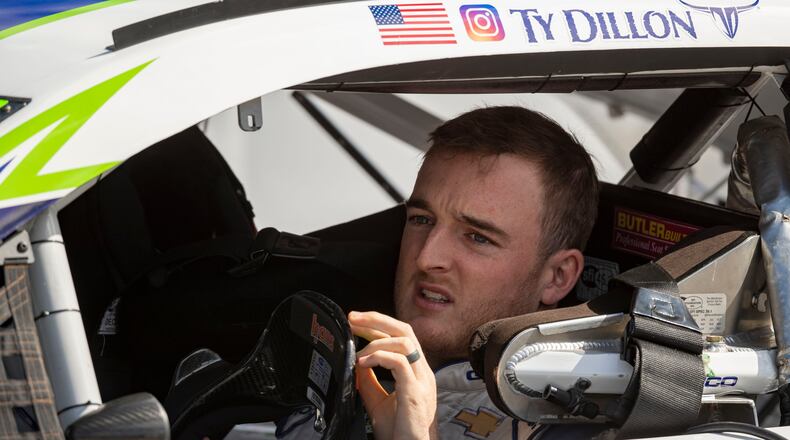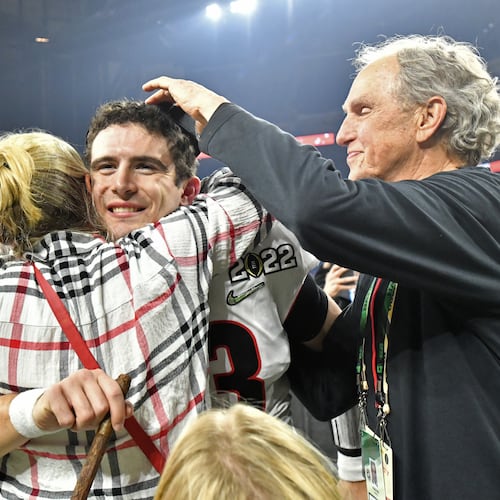No major sport in this country is more monochromatic than NASCAR racing. No sport dances to the tune and lyrics of any given Lee Greenwood country song more than NASCAR. No fan base is more likely to fly the occasional Confederate flag at its tailgate than NASCAR's.
So, when NASCAR’s drivers break from the my-country-right-or-wrong culture of their sport to speak out against very real ills of the nation, their voice can be uniquely resonant. They provide a particularly striking example of just how deeply the malignancy of racism and injustice has eaten into our collective soul.
It should be fairly simple to come out in favor of doing better, of living true to America's creed. Aren't we just stating the obvious when we declare the death of George Floyd an abomination and that the video of a white cop applying a knee to the neck of an unresistant black man is the very image of centuries-long oppression? Doesn't take a hero to speak out on what is irrefutable.
If you are in racing, though, you have to consider the possible costs of questioning anything about the functioning of America.
This is the same sport that during the height of the Colin Kaepernick anthem protest defaulted to jingoism. Granted, the protest made me uncomfortable, too. But never to the extent that it riled some of racing’s leading figures.
When Richard Petty in 2017 said, “Anybody that don't stand up for that ought to be out of the country, period,” he was certainly playing to racing’s base.
At the same time, car owner Richard Childress said that if driver of his chose that form of protest, it would “get you a ride on a Greyhound bus when the national anthem is over.”
Expect no such demonstrations when NASCAR plays Atlanta Motor Speedway this weekend. But here’s a sign of changing times and attitudes within racing. One of Childress’ current drivers – his grandson, in fact – has been among the most vocal on the need for understanding the protesters’ grievances. Ty Dillon hasn’t won a race in 135 starts on NASCAR’s biggest circuit, yet he has taken a lead in speaking out on the persistent issues that Floyd’s death has brought back to the surface.
In April, NASCAR confronted a less grave internal issue when driver Kyle Larson casually dropped the n-word during a virtual race that went out for all the hear. He was fired by Chip Ganassi Racing and indefinitely suspended by NASCAR.
Floyd's death and the resulting unrest reduces that incident to near-trivia, and have compelled some drivers to leave the comfort of the car and speak out on the weightiest of social issues.
Dillon admits that to do that comes with a risk. As he put it, “There is the taunting in your head of: ‘What if I lose this or something happens (to sponsorship or fan support)?’ But I know at the end of the day this is what I believe in and I’ll stand up for what I believe in.”
How certain comments will sit with racing’s backers is “something that a lot of people consider, it keeps a lot of people who feel strongly about this subject from saying things,” Dillon said. “It’s tough. I’m not one to say hey, you need to speak up and tell other people what to do. But for me, I can tell you about my heart on it. I don’t care if I don’t ever win a race or a championship in my life or lose every follower I have on Instagram or sponsor that I have. When my children grow older and I take my last breath, I want to make sure I was on the right side of what was going on in history.”
It’s about, he said, “not about being scared anymore to acknowledge that there is something wrong.”
This week Dillon has engaged in a long Facebook conversation on race, not racing, with the lone African American driver in the NASCAR Cup series, Bubba Wallace, who himself has recently found a strong voice.
An excerpt from one of Dillon’s passionate social media posts: “I never want to be seen as someone who is silent on the subject of racism and social injustice. My heart is in pain for my brothers and sisters in the black community, the family of George Floyd and many other families who have been affected by racism and hate. ... Around the country a lot of my brothers and sisters are currently hurt deeply and have been for hundreds of years without change. I want to be part of the generation that forever changes this narrative.”
Not everyone in his sport, of course, shares the same depth of feelings as Dillon, nor is as willing to discuss them.
Still, an impressive cross-section of stars has joined the chorus.
Whether it’s Dale Earnhardt Jr. throwing his support behind Dillon and declaring via social media, “Black Lives Matter. They are hurting and upset and it’s time for me to listen.”
Whether it’s seven-time champion Jimmie Johnson quoting Dr. Martin Luther King, a name that doesn’t exactly come up much in conversation around the Talladega infield.
Or whether it's Chase Elliott saying in an interview this week, "At the end of the day I think we all want to see change for the better. I think we all want to be better as a society. That goes across all platforms and around the world. I want to see us be better. I think we all know right from wrong."
Credit: David Tulis
Credit: David Tulis
Asked Friday if he has been been proud of how fellow drivers have weighed in this week, Brad Keselowski, who comes to Atlanta as the defending Folds of Honor QuikTrip 500 champion said, "I take satisfaction that they are not blind to it. I take satisfaction that while we don't necessarily have all the answers that we're trying to be supportive."
“I think we all have our own bubbles that we live in, some more than others,” Keselowski added. “Our bubble is not one that is necessarily exposed to the struggles of other groups. Our struggles are trying to win every week, trying to get to the race track, trying to have a respectable family life. By having a limited perspective, it is not advantageous to being a key player in these discussions. That doesn’t mean we can’t be a player.”
Individually, we all have our own gardens to tend when it comes to transforming words and good intentions into some kind of tangible change.
Collectively, big-time stock car racing has much to change in both perception and action.
On that, Dillon has the last word:
“It’s an unfortunate thing that there has been in the past a bit of a stigma about our sport as being not accepting, an underlying racist tone to our sport that I know doesn’t exist in the sanctioning body and the drivers and within the sport. I think there are a lot of great-hearted people in our sport. Also, I think this is a time for us to speak up and confirm that.
“All these drivers in the sport now never wanted to inherit that (stigma), but this is the time for us to change it for history.”
About the Author
The Latest
Featured



